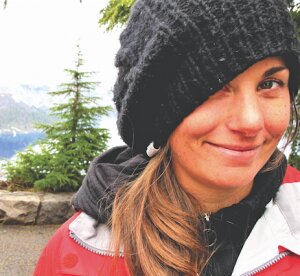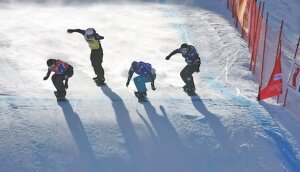 Maëlle Ricker
Maëlle RickerA regular competitor in Mt. Baker Ski Area’s Legendary Banked Slalom, snowboarder Maëlle Ricker was the first Canadian woman to win an Olympic gold medal on home soil, when she emerged victorious in the snowboardcross event of the 2010 Winter Olympics in Vancouver. She will travel to Sochi, Russia to compete in the 2014 games February 7–23, which will mark her fourth time competing in the Olympics. We caught up with Maëlle as she prepared for her trip to Sochi.
Full name: Maëlle Danica Ricker
Born: December 2, 1978, Whistler, Canada
Height: 5' 7" (1.70 m)
Weight: 141 lbs. (64 kg)
MBE: How does it feel to be returning to the Olympics for the fourth time?
MR: I can’t believe it’s the fourth time I will go to the games. Sometimes it feels like yesterday when I was at the opening ceremonies in Nagano 1998, but then at other times it feels like that was a memory from a former life.
MBE: It must be exciting to have the whole world watching you at once, but I suppose it must be nerve wracking as well. How do you handle the pressure?
MR: The pressure this time around is very different from what I felt in Vancouver in 2010. I tend to step up my level of riding when I put more pressure on myself. Hopefully that will ring true in Sochi as well. I really want to do my absolute best to represent everyone who has worked so hard for and who supports Canada~Snowboard.
I love working technically with my coaches, Marcel Mathieu and Rene Brunner, on very specific movements on my snowboard and especially in snowboard cross (SBX) course situations. This is the easiest way to stay focused and keep progressing through a year that’s full of emotions and external distractions. There are always different options to make it mold for everyone’s specific needs … and we make sure we get some great powder days in the mix of all the SBX riding.
MBE: Tell me about how you’ve been preparing for this physically and mentally. I know you had a pretty serious concussion during training earlier in 2013. Is that affecting your performance? Are you still going hard or do you feel yourself holding back?
MR: Robert Joncas is our leader and high performance director. He oversees the whole national team program from half-pipe to slope-style to SBX and alpine. We have a very regimented training plan set out by a team of experts led by our team physiologist, Ben Sporer. Along with Ben, our trainer Anthony Findlay, physiotherapist Marilyn Adams and Dr. Jim Bovard help us follow that plan as closely as possible. Because of this team, I was able to recover and return to snow with 100 percent confidence that we looked after all the details after my concussion in November. I was nervous and feeling a bit rusty at the Lake Louise race in December but now I feel great on my boards and I’ve been pushing my riding every time I strap in.
 MBE: Do you get injured often?
MBE: Do you get injured often?
MR: We take a lot of bumps and bruises in training. I feel like there’s a fine line between being safe in training but still pushing your limit so you improve and learn something when you strap into your board. A good warm-up, a proper diet, a restful sleep, a well-tuned snowboard and a focused mind are helpful ways to stay healthy all season.
MBE: Tell me a little about your boarding style – you have a very unique way of launching yourself through a course. How did you develop your style?
MR: My style in a snowboard cross course is something that comes from a background of free riding and riding half-pipe in Whistler. I try to work every feature for speed while staying balanced and centered on my board down a course.
MBE: What events have you been competing in? What are your expectations for the games?
MR: We just finished racing two world cups in Andorra, a first for our world cup tour. The course was amazing and the country was beautiful and welcoming. I loved it. After the games we will finish the world cup circuit in Switzerland and Spain before coming home to our Canadian National Championships. I hope to be strongest mid-February in Sochi – that would be great.
MBE: How does traveling for competition, events and training affect your personal life? Is it difficult to build relationships and friendships while on the road so much?
MR: It’s difficult to stay in contact on the road. We have busy days on the road with schedules that fill up every hour of the day. It makes it a lot easier [to stay in touch] when we have access to a good Internet connection at the hotel. My friends and family at home are huge support. There’s no way I could keep up this gig without them. My mom and dad are sports fanatics who have supported me day in and day out since I first kicked a soccer ball when I was a kid. I was so happy to be selected to the P&G “Thank You, Mom” campaign because it’s such a neat way to support the families that have sacrificed so much to see their children live out their dreams.
MBE: What keeps you going? Why push yourself so hard?
MR: I love snowboarding. I love being in a high performance atmosphere. I love traveling the world. I love my team. x
EDITOR’S NOTE: Maëlle broke her forearm and required surgery while training in Aspen, Colorado shortly before heading to the Olympics in Sochi. She competed at Sochi, but didn't place. She later admitted the forearm injury was a hinderence.